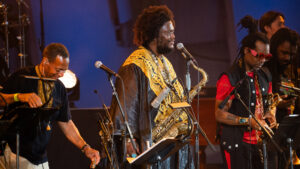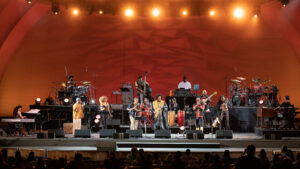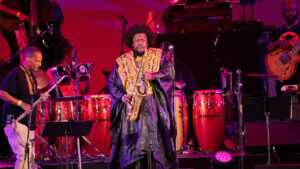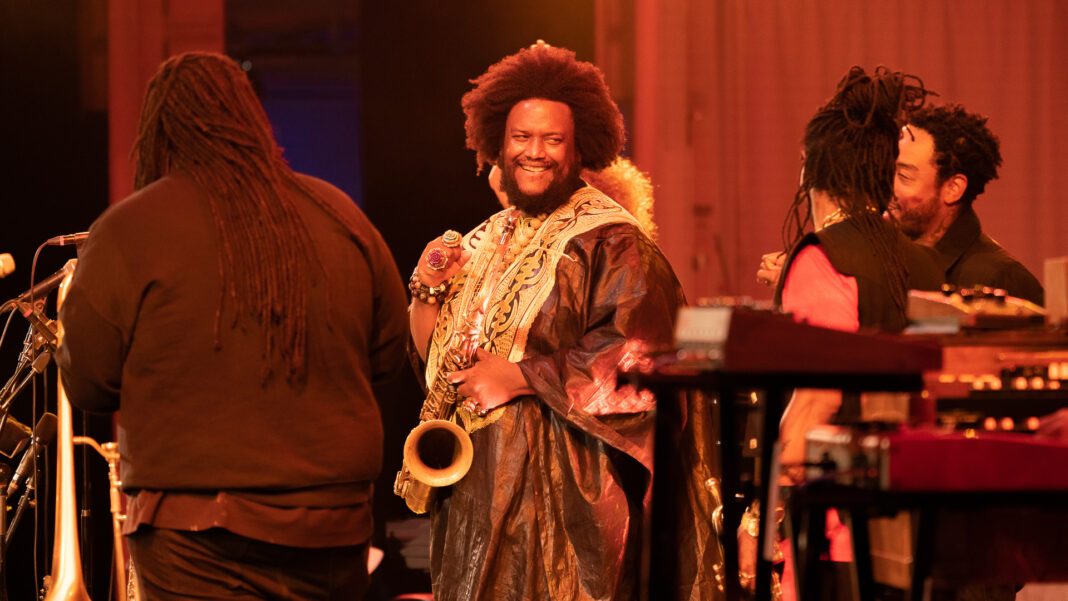
THIS IS THE SIXTH OF OUR BEST OF 23 REVIEW OF INTERVIEWS: “It’s kind of a remarkable thing to be able to have a real relationship with your heroes. It would be beyond my 11 or 12-year-old self. It would be beyond anything he really dreamed of. To know people like Herbie Hancock…they’re almost like mythical figures to us.” That’s how saxophonist and composer Kamasi Washington describes the opportunity to co-curate this weekend’s Hollywood Bowl Jazz Festival with the legendary Hancock.
The two-day festival takes place Saturday and Sunday. The line-up Washington and Hancock have assembled features Bell Biv DeVoe, St. Paul & The Broken Bones, Grammy winner Samara Joy, Aziza, Poncho Sanchez, Lionel Loueke and Gretchen Parlato, Herbie Hancock Institute of Jazz Performance Ensemble at UCLA and LACHSA Jazz on Saturday. Arsenio Hall is the emcee both days.
On Sunday the line-up includes Leon Bridges, Raphael Saadiq, Ledisi, Digable Planets, The Soul Rebels, Big Freedia, Andrew Gouché & Prayze Connection, Boukman Eksperyans, Butcher Brown, The Cardinal Divas of SC and LAUSD Beyond the Bell All District Jazz Band.
Washington will perform both nights. On Saturday with his own band and on Sunday with West Coast Get Down. The members of West Coast Get Down are Washington, Miles Mosley, Tony Austin, Cameron Graves, Ryan Porter, Ronald Bruner, Brandon Coleman and Patrice Quinn.
In 2015 his album The Epic introduced the world in a very serious way to Washington’s other-worldly vision for jazz. He continued with 2018’s Heaven and Earth and the score to the documentary Becoming in 2020.
Washington and I spoke in March about this year’s jazz festival and more. What follows are excerpts from our conversation that have been edited for length and clarity. To see the full interview, please go to our YouTube channel.
I spoke to Herbie Hancock in 2019 when he was on tour in Denver with you. He was curating a show for the Los Angeles Philharmonic called The Next Generation in Jazz. I asked him what he was looking for and he said there so many things changing exponentially. What do you see as the biggest changes in the four years since he and I spoke?
The biggest change I see, which I think it’s a good change – but it can be a scary one as well, is that jazz seems to be, more so than it has in a number of years, kind of re-integrating into the larger musical conversation. For a long time jazz was kind of isolated. We had our own little jazz festivals. We had our own little clubs.
Jazz is now starting to infuse into non-jazz arenas. You see people like Robert Glasper, Terrace Martin, Thundercat, all these other people who are taking jazz and bringing it into other arenas. And I think that’s a beautiful thing. I think that’s good for the music.
I saw a video that you did for [record store] Amoeba’s What’s in My Bag series seven years ago. You were talking about participating in Grammy Camp and how you were so impressed with the young musicians who were there. You said you have to “watch out because they’re coming up so fast.” I don’t think 15 years ago we would have thought that young musicians would take this kind of interest in this type of music. What do you think’s changed?
We live in a different world. They grew up in a different world than where I grew up. There’s some young musicians that are so amazing. I hear them and I’m just floored. There are things that we had that they don’t necessarily have as much anymore. And things that they have now that we didn’t ever dream about having.
Jazz, in its purest form, is an open and freeing art form that those people who are searching for artistry in music, some of them are going to find it no matter what. I think future generations are going to see even more kids gravitating towards jazz and gravitating towards the kind of the freedom and expressiveness that it lends itself to.
These kids are going to bring stuff to the music that I just didn’t have to bring. They have a new a new reality to add. If we want them to play the music, then we have to accept who they are. They’re going to bring who they are and what they’ve been through and what their thoughts and their experiences are. That’s going to be something different to the music than its ever been. And that’s the beauty of it.
Is the word jazz, as a descriptive term for a genre of music, even appropriate anymore? You performed with Metallica. Vijay Iyer had a quote unquote classical work at Walt Disney Concert Hall. Terence Blanchard has his second opera at the Metropolitan Opera in New York. Do you think that labels or genres are becoming passe?
The definition of the word jazz, having any type of control over what the musicians play themselves, that’s always been kind of no good to me. The functionality of a genre, to me, is just an organizational tool. If you’re scrolling through the infinite world of iTunes and you want to try to find some music that is similar to Wayne Shorter, well that’s sort of where it comes in handy. But I think when you put too much weight on it and you make it something that should dictate what the musicians are playing – jazz is this and if you play jazz, you should play this – that’s where it’s inappropriate and always has been.
You’ve released a few singles since Becoming in 2020. And [at the time of this interview] you’re about to embark on a fairly substantial U.S. tour before the Jazz Festival. Does that mean you’re working on some new music that that might finally be recorded?

I’m almost finished now. I got one song that I have to figure out exactly what I want to do with it. I want to put it on this record. Just one more song to record. Pretty soon there’ll be some music coming down the pipeline. If I can finish this one last song.
This is one of those songs that I know is beautiful, but I’m just having a hard time figuring out exactly what it should be. That’s a weird way of saying things, but it’s like having a beautiful flower that you know you want in the garden. You just can’t really figure out exactly where it should be planted, you know?
You told Marc Maron in 2016, “The trick is letting go. Bird and those other guys, they ran right to the edge of the cliff. With Trane you got to run and jump off and just be okay falling down this cliff and have the confidence that somehow I’m going to have to land on my feet.” How does that perspective of Coltrane’s work influence the decisions you make as an artist, as a musician, and even as a man?
Fearlessness is a very important ingredient to making music. It can be kind of scary because you’re revealing your heart. It’s like you’re cracking open your chest and opening your heart up. It’s scary, but the greatest music needs to be fearless. Ultimately you have to have faith in the music and that it will lead you to where it should be.
Listening to someone like John Coltrane and hearing how far he would go, it’s almost like a cliff diver who has a parachute but he just never opens the parachute.
Every musician has a different way of getting to the music that they have in their hearts. I’ve always been a bit meticulous. It’s always been a struggle for me to push the button to go. Once we go it is super easy for me to let go and let the music be what it is. But for some reason in my own head, I feel a need to measure everything is good. Now let’s push this plane out and see how it flies.
Maybe that’s the composer equivalent of measure twice, cut once.
Oh, yeah. Yeah. I’m measure, measure, measure. Ten times.
Ronald Bernard Jr., who is a member of West Coast Get Down, said that being in this band is a gig forever. He went on to say that, “I could be 90 and Kamasi will still call me.” What makes West Coast Get Down a forever gig for you?
Our friendship and our musical relationship started when we were three years old. We’ve all had great teachers and mentors. But we’re probably all most heavily influenced by each other, you know? Whenever one of us would get into something, we all get into it. Every time we find a gem it would circulate among us.
It was just our friends who grew up in our neighborhood and we all just happened to love music and it stuck to us for our whole lives. Our friendship is more on a life level. I always say life is bigger than music and music is a propeller to life. But life is the real thing. Our friendship is forever and music is going to be forever Our musical relationship will be forever.
Max Roach, who I believe has been a big influence on you, said, “Music mirrors where we should go, have gone and can go. Music is an abstraction.” Looking forward to your next album or into the future, what strikes you at this moment in time as the most important thing you’d like your music to mirror?

This next record that I’m doing, it came during a time of me having a lot of personal reflection. A very kind of swirling transitional period in my life. I recently became a father. Normally my thoughts and music are aimed at the infinite. This record is much more based in my reality. I’m a super spacey guy, so it still has that element in it. It’s just more grounded than I’ve ever made before. Really close personally for me.
When you’re speaking a bit more directly, I want to make sure that I am conveying the thoughts that I actually have. Having the courage to just be able to let it be what it is, you know, despite whatever anyone may think.
To see the full interview with Kamasi Washington, please go here.
All photos of Kamasi Washington at the Hollywood Bowl by Farah Sosa (Courtesy Los Angeles Philharmonic Association)










